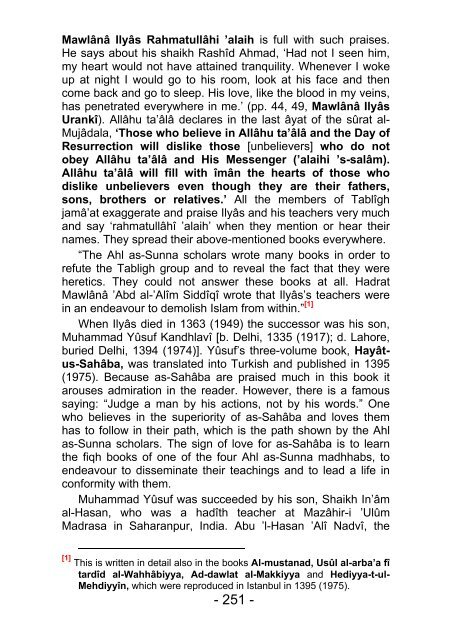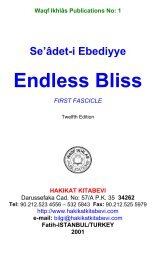- Page 2 and 3:
Publisher’s Note:Those who wish t
- Page 4 and 5:
madrasas, and to cause Muslims to d
- Page 6 and 7:
some âyats and mutawâtir hadîths
- Page 8 and 9:
ISLAM’S REFORMERS(THE BIGOTS OF S
- Page 10 and 11:
Muslim to feign irreligiousness, un
- Page 12 and 13:
anything which could be said to be
- Page 14 and 15:
themselves will not; they will be a
- Page 16 and 17:
learning about the greatness of the
- Page 18 and 19:
grammar, ‘rahîm’ is a ‘sifat
- Page 20 and 21:
“The disputes on whether the Qur
- Page 22 and 23:
proofs showing that Islam is the ri
- Page 24 and 25:
knowledge is learned by way of narr
- Page 26 and 27:
demands the suppression of such evi
- Page 28 and 29:
eason should be freed from being a
- Page 30 and 31:
changed through a proof shown by re
- Page 32 and 33:
a mosque, to a madrasa or to a derv
- Page 34 and 35:
which was more perilous, and thus t
- Page 36 and 37:
next world, or is it because reform
- Page 38 and 39:
next world and works for both,” a
- Page 40 and 41:
extensively but in the sense of tru
- Page 42 and 43:
utterly ignorant people, who believ
- Page 44 and 45:
are in the wrong path. Allâhu ta
- Page 46 and 47:
declares that they speak out of ign
- Page 48 and 49:
ta’âlâ has predestined it so, b
- Page 50 and 51:
astonished at these âyats.The conv
- Page 52 and 53:
(repentance) came together. Repenta
- Page 54 and 55:
Mahmûd ibn ’Abdullah al-’Âlû
- Page 56 and 57:
advantage of this state of the peop
- Page 58 and 59:
They want deeds to be a part of îm
- Page 60 and 61:
will attain its reward.” (Sûrat
- Page 62 and 63:
his faults and feels shame in the p
- Page 64 and 65:
words, writings, caricatures, plays
- Page 66 and 67:
not,” since he who slights these
- Page 68 and 69:
willingly, as humanity requires. It
- Page 70 and 71:
eligious knowledge like those who a
- Page 72 and 73:
performance. Hadrat Prophet (’ala
- Page 74 and 75:
eligion, their government, themselv
- Page 76 and 77:
when His attribute of Jamâl (Beaut
- Page 78 and 79:
talk behind anybody’s back. He do
- Page 80 and 81:
eligion, who, while teaching that t
- Page 82 and 83:
to place ignorance and evils into t
- Page 84 and 85:
every creature comes into existence
- Page 86 and 87:
ta’âlâ by thinking over morals
- Page 88 and 89:
observations on the atom, radioacti
- Page 90 and 91:
and his men had called Mûsâ (’a
- Page 92 and 93:
(’alaihi ’s-salâm) revealed an
- Page 94 and 95:
nation. We have already said that m
- Page 96 and 97:
(radiy-Allâhu ’anh) was based on
- Page 98 and 99:
full of îmân and his beard wet wi
- Page 100 and 101:
our religion! While it would become
- Page 102 and 103:
drunken people whose hearts burn wi
- Page 104 and 105:
her honesty through her reason and
- Page 106 and 107:
eginning not to let the nafs move a
- Page 108 and 109:
ights and freedom more than women w
- Page 110 and 111:
they are too ugly to be looked at o
- Page 112 and 113:
their happiness! Let them get used
- Page 114 and 115:
face and hands, is awrat according
- Page 116 and 117:
grave sin.“When a Muslim who insi
- Page 118 and 119:
month. A man who owns (the amount o
- Page 120 and 121:
place of the world, woman wants to
- Page 122 and 123:
intercourse illegitimately and his
- Page 124 and 125:
private prostitution were prohibite
- Page 126 and 127:
conscience, for ta’addud az-zawja
- Page 128 and 129:
under the harmful influence of rati
- Page 130 and 131:
In the third group of religion refo
- Page 132 and 133:
was the chief of the freemasonic lo
- Page 134 and 135:
egan to observe minutely the way he
- Page 136 and 137:
were to be solved through ijtihâd.
- Page 138 and 139:
ecome hostile towards or torture or
- Page 140 and 141:
Hell meant that sinful believers wi
- Page 142 and 143:
has bestowed upon His Messenger is
- Page 144 and 145:
Muzanî (radiy-Allâhu ’anh). Her
- Page 146 and 147:
Allah! Do shafâ’a for me, come t
- Page 148 and 149:
someone means to entreat them and t
- Page 150 and 151:
called al-Lât and al-Uzza and ange
- Page 152 and 153:
as-Suyûtî and reported by Ibn Mâ
- Page 154 and 155:
Islam by Ahl as-Sunna scholars as,
- Page 156 and 157:
“As Allâhu ta’âlâ has made p
- Page 158 and 159:
time,” and “My companions are l
- Page 160 and 161:
condescended to use the word ‘lit
- Page 162 and 163:
Rasûlullah (sall-Allâhu ’alaihi
- Page 164 and 165:
Book and our Prophet’s Sunna. The
- Page 166 and 167:
ased on the Qur’ân, the Sunna an
- Page 168 and 169:
Damascus.’“It is declared in a
- Page 170 and 171:
his cheek on the ground. He took an
- Page 172 and 173:
Islamic scholars have been the very
- Page 174 and 175:
doubtful îmân is not îmân. But
- Page 176 and 177:
have been following) disagrees with
- Page 178 and 179:
and who followed the same path and
- Page 180 and 181:
hadîth books. When the teachings w
- Page 182 and 183:
that those who perform the dhikr ar
- Page 184 and 185:
matter and observes each rule ident
- Page 186 and 187:
would be to reinforce the teachings
- Page 188 and 189:
Madrasa and the Head of the Pious F
- Page 190 and 191:
time, and for the accurateness of t
- Page 192 and 193:
Christianity, will shake hands and
- Page 194 and 195:
“There is a devil in every person
- Page 196 and 197:
preaches and books of Burhân ad-d
- Page 198 and 199:
“Islam is not a religion to be im
- Page 200 and 201: salâm) said ‘harâm’ and who d
- Page 202 and 203: it is sufficient for Muslims and dh
- Page 204 and 205: spend all their income in their own
- Page 206 and 207: kirâm admitted this and came to an
- Page 208 and 209: In Durr-i Yektâ, one of the most v
- Page 210 and 211: permissible.5) If you donates a par
- Page 212 and 213: easons and points of view are calle
- Page 214 and 215: it will be cruelty. By that it is n
- Page 216 and 217: permission, yet he has to pay for i
- Page 218 and 219: If a person mixes the property he h
- Page 220 and 221: The hearts will not be as pure and
- Page 222 and 223: permissible for them to rebel again
- Page 224 and 225: means and to make the most modern m
- Page 226 and 227: He supposes Islam as a theory, a hu
- Page 228 and 229: He wanted Islam’s basis to change
- Page 230 and 231: spending millions of dollars in a c
- Page 232 and 233: who were adherent to Islam from pub
- Page 234 and 235: hesitancy about acts of disposal co
- Page 236 and 237: he is a heretic without a certain m
- Page 238 and 239: them to their disastrous destinatio
- Page 240 and 241: scholars. Those who will make one a
- Page 242 and 243: pure Arab mind and the brilliant Is
- Page 244 and 245: countries.After quoting the precedi
- Page 246 and 247: officials of Bait al-mâl means its
- Page 248 and 249: for centuries in Islamic states. Bu
- Page 252 and 253: director of Nadwat al-ulamâ’ [fo
- Page 254 and 255: way of prophets (’alaihi mu ’s-
- Page 256 and 257: this invitation will not be complet
- Page 258 and 259: Qur’ân through the known tafsîr
- Page 260 and 261: fard and, to them, Allâhu ta’âl
- Page 262 and 263: Jam’at at-tablîgh show that utte
- Page 264 and 265: salâm upon this great Prophet with
- Page 266 and 267: denied only by Muhammad ibn ’Abd
- Page 268 and 269: that they themselves are the real M
- Page 270 and 271: century’ and about those who beli
- Page 272 and 273: them. How could a man of bid’a be
- Page 274 and 275: Question 10: “They say, ‘The mo
- Page 276 and 277: passing by, said to me, ‘Do not s
- Page 278 and 279: 60 - When religion reformers want t
- Page 280 and 281: who, he said, had told it to him ha
- Page 282 and 283: sin committed. There are three cond
- Page 284 and 285: wrong belief of his is a sin which
- Page 286 and 287: neglect a sunna. When it is unknown
- Page 288 and 289: with pure îmân and heart are call
- Page 290 and 291: These appearances are not the imâm
- Page 292 and 293: this time of night. Yet I did not h
- Page 294 and 295: slavery.” Yes, in order to praise
- Page 296 and 297: his age six, his blessed mother, Â
- Page 298 and 299: captivated. When she told him the e
- Page 300 and 301:
gone to distant places and to comme
- Page 302 and 303:
I come?It is improper to take somet
- Page 304 and 305:
nubuwwa: “One of the most honoura
- Page 306 and 307:
the one hand, and the Wahhâbîs an
- Page 308 and 309:
and is one only through the compreh
- Page 310 and 311:
work in the world. These branches o
- Page 312 and 313:
elief (îmân), it is necessary to
- Page 314 and 315:
seems to be indifferent towards wor
- Page 316 and 317:
teachings of the Sharî’at which
- Page 318 and 319:
hungry eats something. He who becom
- Page 320 and 321:
is a vice.” It was stated in anot
- Page 322 and 323:
person is a Walî?” He said, “I
- Page 324 and 325:
a hadîth-i-sherîf, “He who hate
- Page 326 and 327:
GLOSSARYBI, SP, AM, AEI and EB (I-V
- Page 328 and 329:
-Ka’ba: the big room in al-Masjî
- Page 330 and 331:
shirk: (statement, action causing)
- Page 332 and 333:
A’ûdhu billah-imin-esh-shaytân-




